-

新人教版高中英语必修2Unit 1 Cultural Heritage-Discovering Useful Structure教案一
This teaching period mainly deals with grammar “restrictive relative clauses.” To begin with, teachers should lead students to revise what they have learned about the relative pronouns and relative adverbs. And then, teachers move on to stress more special cases concerning this grammar, such as the “preposition+ relative pronouns which and whom” and cases where we can omit the relative pronouns. This period carries considerable significance to the cultivation of students’ writing competence and lays a solid foundation for the basic appreciation of language beauty. The teacher is expected to enable students to master this period thoroughly and consolidate the knowledge by doing some exercises. 1. Guide students to review the basic usages of relative pronouns and adverbs of attributive clauses.2. Lead students to learn to use some special cases concerning restrictive relative clauses flexibly.2. Enable students to use the basic phrases structures flexibly.3. Strengthen students’ great interest in grammar learning.1. Help students to appreciate the function of relative pronouns and adverbs of attributive clauses in a sentence2. Instruct students to write essays using the proper relative pronouns and adverbs of attributive clauses.本节语法思考:定语从句在复合句中的作用是什么? 关系词有哪些?定语从句在复合句中的作用相当于形容词,它在句中作定语修饰名词或代词。他们在先行词和定语从句之间起到联系作用,同时在意义上代表先行词并在定语从句中担任一个成分。被定语从句所修饰的词称先行词,定语从句一般放在先行词的后面。

新人教版高中英语必修2Unit 2 Wildlife Protection-Discovering Useful Structure教案二
2.表示现阶段正在进行的被动动作(该动作在说话的瞬间未必正在进行)。Many interesting experiments are being carried out these days.(说话时,并不一定正在进行)3.表示一种经常性的被动行为,常和always,constantly 等表示频度的副词连用,这种用法常常带有赞扬或厌恶的感情色彩。He is always being praised by the leader.4.表示按计划或安排主语将要承受谓语动词所表示的动作(仅限于少数及物动词)。A party is being held tonight.Step 4 Special cases1.像take care of, look after, talk about, think of等动词与介词构成的短语用于现在进行时的被动语态时, 其中的介词不可省略。The ways to stop illegally hunting are being talked about. 2.可与部分情态动词连用,表示对正在发生的事情的推测。She may be being punished by her mother.3.有时可表示按计划或安排将要进行的一个被动动作。A celebration is being held this weekend for his success.4.某些表示“状态、心理活动、存在”等的动词,如have,want,need,love,一般不用现在进行时的被动语态,而常用一般现在时的被动语态。With the population increasing,more land is needed.5.“be+under/in+n.”可表示现在进行时的被动意义。My computer is under repair.=My computer is being repaired.

新人教版高中英语必修2Unit 2 Wildlife Protection-Reading and Thinking教案一
The listening and speaking part aims at how to protect and help endangered animals by listening, speaking and talking about the facts and reasons. This lesson analyzes the decreasing clause of Tibetan antelope population and the measures of protecting Tibetan antelopes. So students can be guided to learn to analyse the title and use different reading skills or strategies, like scanning, skimming and careful reading.1. Read quickly to get the main ideas and the purpose of going to Tibetan; read carefully to understand what the author see and think.2. Understand the sentences of the present continuous passive voice such as “Much is being done to protect wildlife.” and the inverted sentence “Only when we learn to exist in harmony with nature can we stop being a threat to wildlife and to our planet.”3. Enhance the awareness of protecting wildlife.4. Cultivate the reading methods according to different materials.1. Read quickly to get the main ideas and the purpose of going to Tibetan; read carefully to understand what the author see and think.2. Understand the sentences of the present continuous passive voice such as “Much is being done to protect wildlife.” and the inverted sentence “Only when we learn to exist in harmony with nature can we stop being a threat to wildlife and to our planet.”3. Cultivate the reading methods according to different materials.Step 1 Leading-inWatch a video about elephants and whales and then ask:Why are they endangered ? They are killed/hunted

新人教版高中英语必修2Unit 2 Wildlife Protection-Reading For Writing教案一
1. 标题首先根据海报的特点、格式写明标题。海报中往往把内容作为大标题。例如: Save the earth, Save the birds。2. 正文部分不同的海报其正文部分的侧重点不同。对于介绍性的海报, 首先要引出话题, 其次列出原因, 最后是总结。对于宣传类的海报, 要写明具体内容, 如: 活动内容, 地点以及参加活动的注意事项, 主持或举办单位等。1. 图片: 要选择引人注目的图片, 与主题要相关, 色彩明亮。话题句式 1. It is a treasure of our country. 它是我国的国宝。2. Believe it or not, at present only several thousand pandas exist in the world. 信不信由你, 目前世界上仅现存几千只熊猫。 3.It’s because of human activities that tigers are endangered. 正是因为人类的活动, 老虎处于濒危的状态。4. Many wild animals are in danger of dying out. 很多野生动物面临着灭绝的危险。 5. The government has taken effective measures to protect them. 政府已采取有效的措施来保护它们。6. People should raise the awareness of the protection of wild animals. 人们应该提高保护野生动物的意识。 7. It’s amazing that there are merely less than 1, 000 finless porpoises living in China. 非常令人吃惊, 目前中国仅有不足1 000只江豚。

新人教版高中英语必修2Unit 3 The Internet-Listening &Speaking&Talking教案一
Listening and Speaking introduces the topic of “ask about online habits”. Many middle school students have been surfing the Internet for many years, but what they do with the Internet and how much time they spend every day may not be very clear to themselves, nor to other students. This section allows students to investigate their peers' Internet use, which is conducive to their mutual understanding and understanding of the Internet. It can also help them reflect on their own online behavior, learn from other people's good online habits, and get rid of their bad online behavior.The listening text of this section is an investigation interview. The investigators interview specific groups with the same questions to obtain information, so as to understand their views, practices or attitudes on this issue. There are two specific questions: “how much time do you spend online every day? What do you usually do online?”. The answers of the three respondents provide rich and different information, and achieve the purpose of the investigators. The oral discourse structure of survey interviews generally includes greeting and explaining the purpose of the interview, presenting the interview questions and the respondents' answers. Listening and Talking introduces the theme of “choosing the right application ". Listening text is a conversation between Laura and Xiao Bo. In this part of listening, “oink”; “piggy bank” may cause the students' hearing comprehension limitation. Oink refers to sound word and pig's sound. So, add some oink to my piggy bank is often used to describe "making a little money".1. Guide students to understand the content of listening texts in terms of listening for definitions.2. Cultivate students' ability to define words and understand an investigation interview.

新人教版高中英语必修2Unit 4 History and Traditions-Listening&Speaking&Talking教案一
This unit is about history and traditions. From the opening page, we can know that this unit will introduce the history and traditions around the world. As Marcus Garvey says “A people without the knowledge of their past history, origin and culture is like a tree without roots”, it is important for students to realize the importance and value of knowing the history and traditions and their further meanings. And this part ( listening and speaking ) is divided into two parts: Part A---share views on historic sites, Part B ---talk about a visit to a historic tourist destination. By talking with a foreigner, the speakers introduce the historic attractions and their cultures. Part A is that William, a British student, who was going to visit the Confucius Temple and a Chinese student, Xiao Kong, who was going to the Confucius Temple to meet with the members of the research group, went together and exchanged their views on the Confucius Temple, Confucius, Confucius' descendants and Confucius' educational thoughts. Part B is a conversation between Xiao Yan, a youth hostel receptionist and Paul, a backpacker about the feelings and experience after visiting the Chinese famous tourist attraction Pingyao.1. Guide students to understand the content of listening texts in terms of the whole and key details; 2. Cultivate students' ability to guess the meaning of words in listening; discuss with their peers how to talk about historic spots and great person.3. Instruct students to use functional sentences of showing one’s excitement, surprise and disappointment.1. Guide students to understand the content of listening texts in terms of the whole and key details; 2. Cultivate students' ability to discuss with their peers the related topics.3. Enable students to use the functional items of showing one’s excitement, surprise and disappointment.

新人教版高中英语必修2Unit 4 History and Traditions-Reading and Thinking教案二
Step 5 While reading---Task 3Read the text again and answer the following questions.Q1: How many countries does the UK consist of ?4 Q2: What are the four countries of the United Kingdom?England, Wales, Scotland and Northern Ireland Q3: Which two were the first to be joined together ?England and WalesQ4: What are the two chief advantages of studying the history of a country ?The first one is to help you understand more about the country and its traditions.The second one is to make visiting it more enjoyable.Q5: What’s the author’s attitude towards studying the history ?Supportive/positiveStep 6 Post reading---Retell the textThe United Kingdom, Great Britain, Britain, England—many people are confused by (1)_____ these different names mean. In the 16th century, the nearby country of Wales (2) __________(join) to the Kingdom of England. In the 19 th century, the Kingdom of Ireland was added to create the United Kingdom of Great Britain and Ireland. Finally, the southern part of Ireland (3) ______ (break) away from the UK, which resulted in the full name we have today. However, most people just use the (4)_________(shorten) name: the UK. The four countries (5)__________ belong to the United Kingdom work together in some areas. There were four sets of invaders and the last group were the Normans. They had castles (6)_________(build) all around England and made changes (7)__________ the legal system. Studying the history of the country will make your visit much more (8)_________(enjoy). The capital city London is (9)___ ancient port city that has a history (10)______(date) back to Roman times. 1. what 2.was joined 3.broke 4.shortened 5.that 6. built 7.to 8.enjoyable 9.an 10.dating Step 6 Homework

新人教版高中英语必修2Unit 4 History and traditions教案
这个地区有着深厚的传统。既学既练:为了让更多的外国游客了解中国文化,欣赏中国美丽的自然风光,感受中国发生的巨大变化,某外文杂志社将出版一本英语小册子来介绍中国的旅游景点。该杂志社邀请你为该小册子写一篇英语短文来介绍杭州,内容包括:1.杭州的位置(中国东南部)、面积(16 000多平方公里)及历史(2 200多年)等;2.杭州的旅游特色(自然风景、传统文化、特色小吃等);3.希望更多的游客来杭州参观。注意:1.词数80左右;2.可适当增加细节,以使行文连贯。Located in the southeast of China, Hangzhou is a beautiful city.Dating back more than 2,200 years, Hangzhou covers an area of more than 16,000 square kilometers.In Hangzhou, you can visit the West Lake, whose scenery is fascinating.In addition, you can’t miss its cultural relics and historical sites, from which you will learn more about excellent Chinese traditional culture and traditions.In Hangzhou, the special snacks are famous and visitors from different parts of the world think highly of them.As a tourist attraction, Hangzhou attracts a large number of visitors from home and abroad every year.Once you come to China, Hangzhou is a scenic spot you can’t miss.

新人教版高中英语必修2Unit 5 Music-Listening and Speaking教案
This lesson is about music. Students can classify the types of music through the instruments and its sound and can talk about their preferences about music, even join some activities and play a role in them according to their musical talents. On the basis, they are guided to use the languages to express their preferences and some plosive sounds and their rules.1. Classify the music types through the instruments and its sound.2. Listen and understand what the speakers’ preferences are and the reasons; talk about their own preferences and give their own reasons, using these sentences: “What kind of music do you like? And why? “ “Because it makes/gives me energy/peaceful.../touches my heart...”.3. Learn some plosives and the rules.4. Join some activities and play a role in them according to the talents. 1. Listen and understand what the speakers’ preferences are and the reasons;2. talk about their own preferences and give their own reasons, using these sentences: “What kind of music do you like? And why? “ “Because it makes/gives me energy/peaceful.../touches my heart...”.3. Learn some plosives and incomplete plosives and its rules.Step 1 Lead inPoint at the pictures on P50 and ask Q1: What are the people doing in the pictures below?Q2: What kind of music they are?Then play the MP3s one by oneStep 2 ListeningTask 1: A reporter from the school newspaper is interviewing students about music. Listen to the interviews. Draw lines between the words to make complete sentences. Some words will not be used.
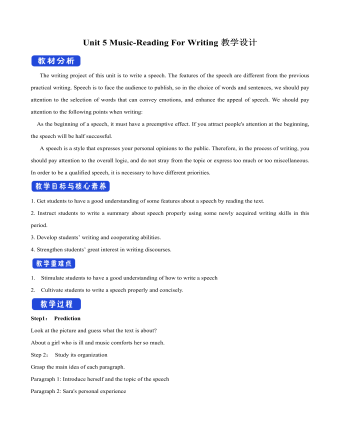
新人教版高中英语必修2Unit 5 Music-Reading For Writing教案一
(4)Now we have heard a number of outstanding speeches ... 我们已经聆听了许多精彩的发言……(5)Because we wanted the nations of the world, working together, to deal with ... 因为我们希望全世界各国团结起来去应对……(6)And if we do not act ... 如果我们不采取行动……(7)Now, I share the concerns that have been expressed ... 我也同意对于……表达的担心(8)Let us show the world that by working together we can ... 让我们告诉全世界,通过一起努力我们可以……(9)It is now time for us to ... 是时候我们……(10)And I have always wished that ... 我一直希望……(11)Thank you for letting me share this day with me.感谢你们和我共度这一天。实践演练:假如你是高中生李华,你校将举办一次以“音乐”为主题的演讲比赛,请你按照主题,写下你的演讲稿。注意:词数100左右。First of all, thank you for listening to my speech. My topic is: love music like love yourself.Music is like the air we need to maintain our normal lives around us. You can't imagine how terrible a world without music would be. Movies and TV shows have no music, only dry conversations and scenes; mobile phones only vibrations; streets only noisy crowds; cafes, western restaurants only depressed meals. What a terrible world it is!As a student, I hope we all can enjoy the fun brought by music in our spare time. Instead of just listening to music, we can even make our own music. Let's enjoy the fun of music!Thanks again for your attention!
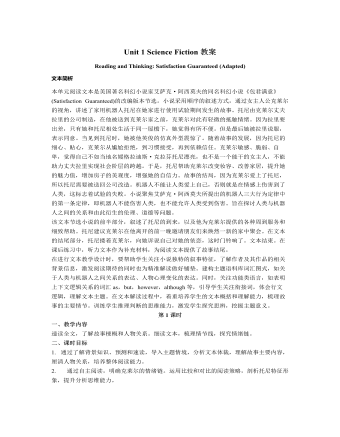
新人教版高中英语选修4Unit 1 Science Fiction教案
本活动旨在落实课时教学目标2。 1.Think, discuss and share. Students form groups of 4, discuss about the given ending make comments. Q1: Do you like the ending? Q2: Was it a logical ending? Why so or why not? [设计意图]通过引导学生思考、讨论、评价,比较个人、同伴所预测的结局和听力文本所给定的结局的异同点,深化对文本的认知,发展学生的评判性思维能力。 Activity 4: Exploring Asimov’s three laws of robotics and the purpose of the writing 本活动旨在落实课时教学目标3。 1. Get to know Isaac Asimov’s three laws of robotics. The teacher shares Isaac Asimov’s three laws of robotics. The three laws state that: ①A robot may not injure a human being or, through inaction, allow a human being to come to harm. ②A robot must obey any orders given to it by human beings, except where such orders would conflict with the First Law. ③A robot must protect its own existence as long as such protection does not conflict with the First or Second Law. Q: How does Tony’s story relate to the laws? 2. Figure out Isaac Asimov’s purpose of writing Satisfaction Guaranteed. The students express their opinions about the author’s writing purpose. Q: Why did Isaac Asimov write such a story? S: To explore the relationship between robots and humans. [设计意图]通过了解艾萨克·阿西莫夫所制定的机器人三大定律,加深学生对文本的理解,深入探究文本的主题意义。推理作者的写作目的,联系生活实际,思考人类与机器人的关系。

新人教版高中英语必修3Unit 5 The Value of Money-Discovering Useful Structures导学案
4.They were going to find someone to take part in their bet when they saw Henry walking on the street outside.[归纳]1.过去将来时的基本构成和用法过去将来时由“would+动词原形”构成,主要表示从过去某一时间来看将要发生的动作(尤其用于宾语从句中),还可以表示过去的动作习惯或倾向。Jeff knew he would be tired the next day.He promised that he would not open the letter until 2 o'clock.She said that she wouldn't do that again.2.表示过去将来时的其他表达法(1)was/were going to+动词原形:该结构有两个主要用法,一是表示过去的打算,二是表示在过去看来有迹象表明将要发生某事。I thought it was going to rain.(2)was/were to+动词原形:主要表示过去按计划或安排要做的事情。She said she was to get married next month.(3)was/were about to+动词原形:表示在过去看来即将要发生的动作,由于本身已含有“即将”的意味,所以不再与表示具体的将来时间状语连用。I was about to go to bed when the phone rang.(4)was/were+现在分词:表示在过去看来即将发生的动作,通常可用于该结构中的动词是come,go,leave,arrive,begin,start,stop,close,open,die,join,borrow,buy等瞬间动词。Jack said he was leaving tomorrow.
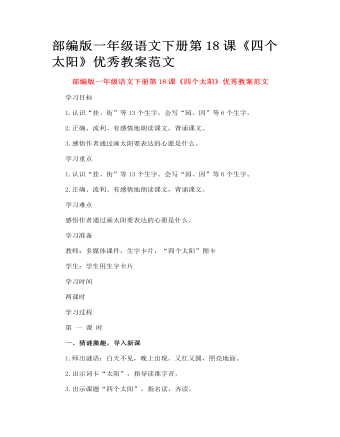
部编版一年级语文下册第18课《四个太阳》优秀教案范文
猜谜激趣,导入新课 1.师出谜语:白天不见,晚上出现。又红又圆,照亮地面。 2.出示词卡“太阳”,指导读准字音。 3.出示课题“四个太阳”,指名读,齐读。 4.引导质疑:读了课题,你的小脑瓜里是不是蹦出了小问号? 二、初读课文,认记生字 1.出示课件:带拼音生字,指名带读。 2.出示课件:去拼音生字并打乱顺序,摆字卡,自由练习朗读。 3.游戏:我说你找喊名字。 4.指导识记生字方法。 5.巩固游戏:我把生字送回家。动画演示,指导写字 1.猜谜引入:大口框里有个“大” 2.出示课件:“因”书写笔顺规则 看了动画,你知道了什么? 3.出示课件:“园” “园”与“因”哪里长得很像?书写的时候要注意些什么?(同样先里面后封口) 4.师范写“园”“因”,讲解书写要领。 5.生自由练写,师巡回指导。 6.集体评价。
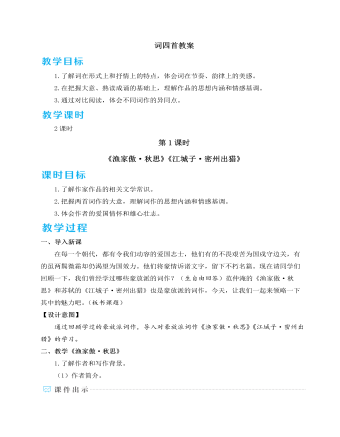
人教部编版语文九年级下册词四首教案
词人如此有违常规,造成了一种拗峭不凡的气势,词意更加纵横驰骋,抒情更加酣畅淋漓。2.如何理解《满江红》(小住京华)中的“俗子”?从这首词的语境来看,“俗子”当指词人的丈夫。这与“八年风味”的婚姻反思,与“青衫湿”的悲情是前后呼应的。秋瑾在后来写的一首《沁园春》中说:“有多少,遇王郎天壤,辜负才华。”在长篇弹词《精卫石》中说:“道韫文章男不及,偏遇个天壤王郎冤不冤。”这些词句,都是借谢道韫所嫁非人,间接抒发了她对婚姻的失望。王郎天壤(天壤王郎),是谢道韫鄙薄她丈夫王凝之的话,出自《世说新语·贤媛》:“一门叔父,则有阿大、中郎;群从兄弟,则有封、胡、遏、末,不意天壤之中,乃有王郎!”当然,从广义上理解,这首词中的“俗人”,也可泛指世俗之人。秋瑾到日本后写的《鹧鸪天》词中,有“祖国沉沦感不禁,闲来海外觅知音”的词句,可见“觅知音”意指寻求救国之道,不一定指个人的情感问题。
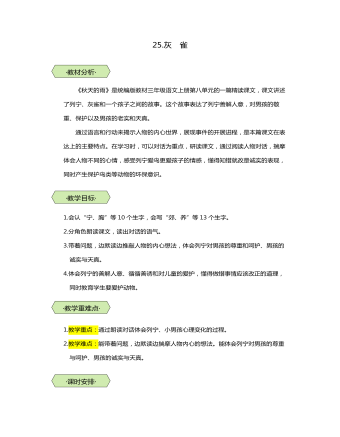
统编版三年级语文上第25课灰雀教学设计教案
《秋天的雨》是统编版教材三年级语文上册第八单元的一篇精读课文,课文讲述了列宁、灰雀和一个孩子之间的故事。这个故事表达了列宁善解人意,对男孩的敬重、保护以及男孩的老实和天真。通过语言和行动来揭示人物的内心世界,展现事件的开展进程,是本篇课文在表达上的主要特点。在学习时,可以对话为重点,研读课文,通过阅读人物对话,揣摩体会人物不同的心情,感受列宁爱鸟更爱孩子的情感,懂得知错就改是诚实的表现,同时产生保护鸟类等动物的环保意识。 1.会认“宁、胸”等10个生字,会写“郊、养”等13个生字。2.分角色朗读课文,读出对话的语气。3.带着问题,边默读边推敲人物的内心想法,体会列宁对男孩的尊重和呵护、男孩的诚实与天真。4.体会列宁的善解人意、循循善诱和对儿童的爱护,懂得做错事情应该改正的道理,同时教育学生要爱护动物。 1.教学重点:通过朗读对话体会列宁、小男孩心理变化的过程。2.教学难点:能带着问题,边默读边揣摩人物内心的想法。能体会列宁对男孩的尊重与呵护、男孩的诚实与天真。 2课时
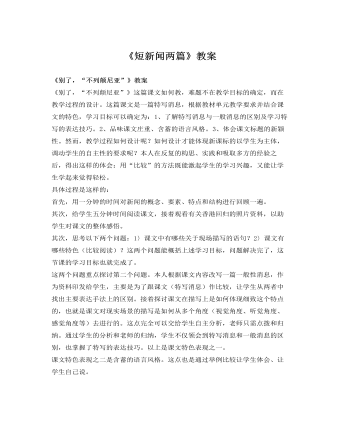
人教版高中语文《短新闻两篇》教案
罗森塔尔突破了“客观报道”“零度写作”的框框,把自己和其他参观者在奥斯维辛访问时的感受当做文章的主要内容来写,传达出每一个良知者的共同心声。教师总结:细节描写是耐人寻味的。文章没有阴森恐怖的镜头,没有血腥的画面,只是重现了新闻的事实真相,但透过细节却能引发人们对生命,对人性的思考。在作者看似平静的叙述中抒发了对德国纳粹残酷暴行的沉重控诉,更表达了作者对自由、和平与祥和的向往四、拓展延伸:《奥斯维辛没有什么新闻》这一作品本身的价值在哪?社会价值又在哪,能不能从这两个角度思考,几人合作试写一段颁奖词?范例:《奥斯维辛没有什么新闻》突破新闻“零度写作”原则,着眼细节,以冷峻的视角,深沉地描述了今天的奥斯维辛集中营纪念馆。在恐怖与快乐、战争与和平、历史与现实的反差中,它召唤起人们关于灾难的记忆、关于生命的思考、关于人性的自省。它的发表充分地表现了一个新闻记者的使命感,更以迫人的力量震撼生者的心,成为新闻史不朽的名篇。
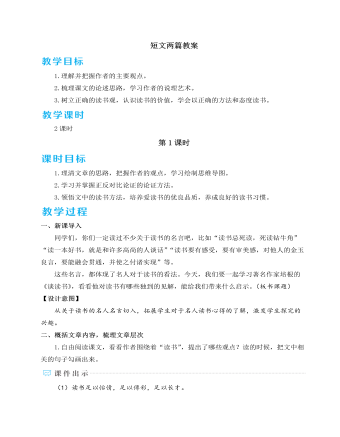
人教部编版语文九年级下册短文两篇教案
一、新课导入同学们,你们一定读过不少关于读书的名言吧,比如“读书忌死读,死读钻牛角”“读一本好书,就是和许多高尚的人谈话”“读书要有感受,要有审美感,对他人的金玉良言,要能融会贯通,并使之付诸实现”等。 这些名言,都体现了名人对于读书的看法。今天,我们要一起学习著名作家培根的《谈读书》,看看他对读书有哪些独到的见解,能给我们带来什么启示。(板书课题)【设计意图】从关于读书的名人名言切入,拓展学生对于名人读书心得的了解,激发学生探究的兴趣。二、概括文章内容,梳理文章层次1.自由阅读课文,看看作者围绕着“读书”,提出了哪些观点?读的时候,把文中相关的句子勾画出来。(1)读书足以怡情,足以傅彩,足以长才。(2)读书时不可存心诘难作者,不可尽信书上所言,亦不可只为寻章摘句,而应推敲细思。(3)书有可浅尝者,有可吞食者,少数则须咀嚼消化。(4)读书使人充实,讨论使人机智,作文使人准确。(5)读史使人明智,读诗使人灵秀,数学使人周密,科学使人深刻,伦理学使人庄重,逻辑修辞之学使人善辩:凡有所学,皆成性格。
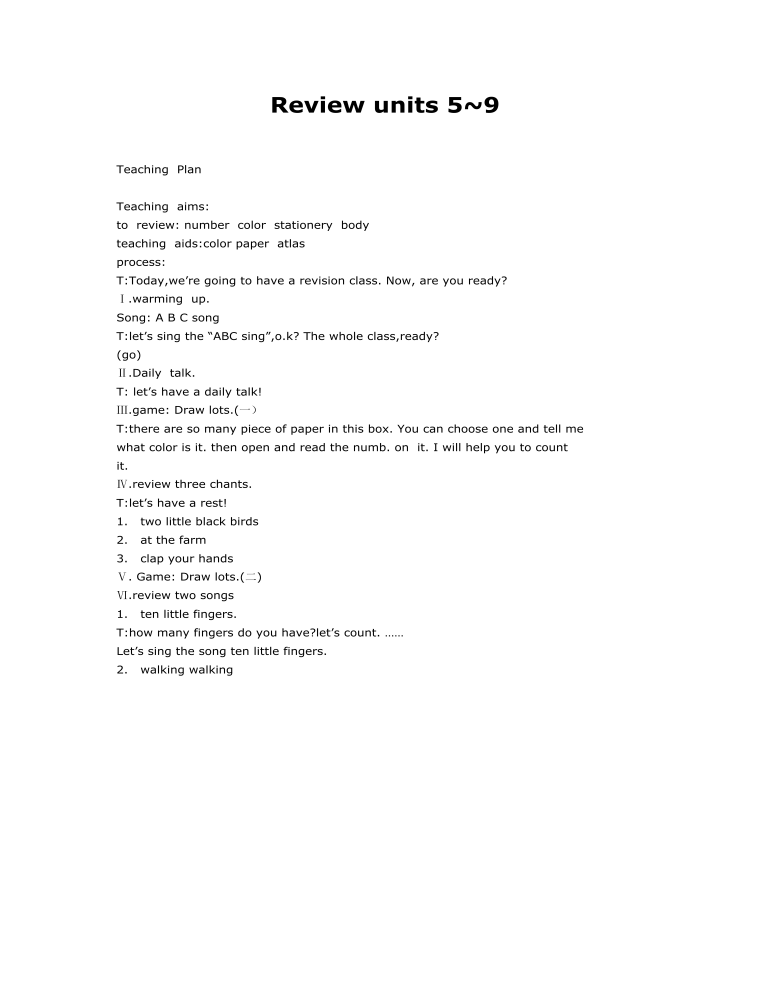
大班英语教案:Review units 5~9
T:Today,we’re going to have a revision class. Now, are you ready?Ⅰ.warming up.Song: A B C songT:let’s sing the “ABC sing”,o.k? The wholeclass,ready?(go)Ⅱ.Daily talk.T: let’s have a daily talk!Ⅲ.game:Draw lots.(一)T:there are so many piece of paper in this box.You can choose one and tell me what color is it. then open and read the numb.on it. I will help you to count it.
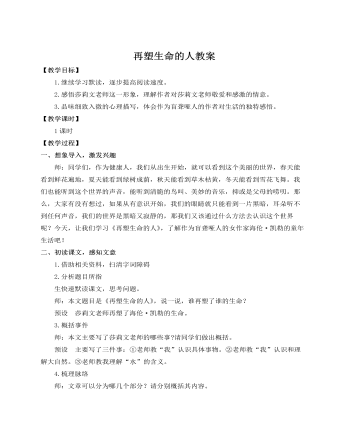
人教部编版七年级语文上册再塑生命的人教案
海伦·凯勒一岁多时不幸染上疾病,致使她双目失明、双耳失聪,随之又丧失了说话的能力。从此,她坠入了一个黑暗而沉寂的世界,陷入了痛苦的深渊。17岁,海伦·凯勒考进哈佛大学,还掌握了英、法、德、拉丁和希腊五种语言。大学期间,她开始写作。毕业后,她把自己的一生献给了盲人福利和教育事业,并在繁忙的工作中先后完成了14部具有世界影响的著作,最著名的是其自传《假如给我三天光明》。海伦·凯勒无比敬爱和感激自己的老师莎莉文,她说:“假如给我三天光明,我首先要长久地凝视我的老师——安妮·莎莉文!”海伦把自己的学习分成四个步骤:1.每天用三个小时自学。2.用两个小时默记所学的知识。3.再用一个小时的时间将自己用三个小时所学的知识默写下来。4.剩下的时间她运用学过的知识练习写作。在学习与记忆的过程中,她只有一个信念:她一定能够把自己所学习的知识记下来,使自己成为一个有用的人。她每天坚持学习10个小时以上,经过长时间的刻苦学习,她掌握了大量的知识,能熟练地背诵大量的诗词和名著的精彩片段。
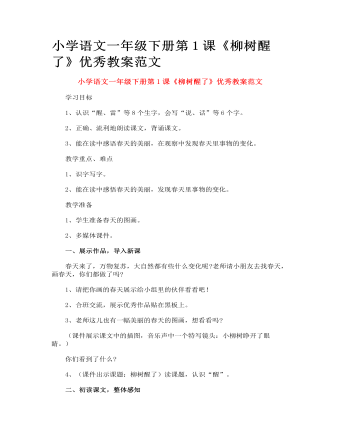
小学语文一年级下册第1课《柳树醒了》优秀教案范文
朗读背诵,感悟课文 1、你从什么地方知道柳树醒了?分小组交流交流。 (根据学生的回答依次学习相应小节。) 2、学生在读书交流中,随机出示课件中相应小节,帮助领悟,读好“醒、软、绿、飞、高”等词。 第一节:(课件出示:天空春雷一声响,地下一棵棵柳树摇了摇身子。) 想象:春雷会跟柳树说什么? 第二节:(课件出示:春雨沙沙,柳枝渐渐吐绿,向下垂。) 你觉得这一小节该怎样读呢? 第三节:(课件出示:春风吹动柳枝,柳枝飘荡) 引读,你们瞧!春风给柳树梳头,梳着梳着——(生读)。 第四节:谁想读第四节?谁知道“小柳絮”是什么样儿的?理解“柳絮”:(课件出示:一双燕子在空中飞来飞去,柳树上沾满上面结满有白色绒毛的种子,绒毛随风飞散。) 第五小节:(课件出示:柳树枝条在风中飘荡,孩子们在树下玩耍。)看,小柳树醒了,它在干什么?会班齐读。 3、再读读课文,想想:你从哪里知道“柳树醒了”?“柳树醒了”说明什么? 4、和同桌小伙伴一起试着背背课文,比比谁先会背。(课件出示课文插图,同时配乐。)




